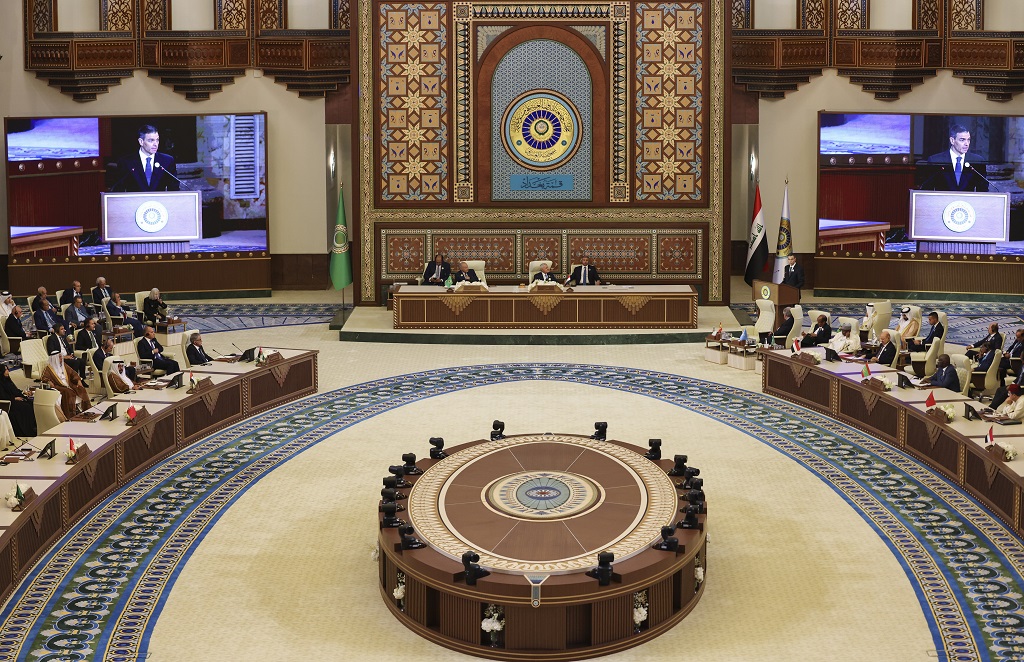RAMALLAH, April 28, 2018 (WAFA) - The Palestinian National Council (PNC), the parliament in exile and top Palestinian decision-making body, is scheduled to begin a critical, yet controversial, session on Monday in Ramallah, more than 20 years since it held its last ordinary session and nine years since holding an extraordinary session to replace deceased members of the Palestine Liberation Organization’s (PLO) 18-member Executive Committee.
However, the meeting is going to be held without a Palestinian consensus and amidst serious division over the timing and venue of the meeting, as well as its political program.
When PNC Speaker Salim Zanoun sent out invitations to the Ramallah session earlier this month, he said that the PNC meets at a critical juncture in the history of the Palestinian struggle for freedom and independence as a result of the “complicated conditions facing the Palestinian cause and the challenges facing the future of the Palestinian issue and the Palestinian national project.”
The call to convene the PNC was first made by the PLO’s Central Council, the second in the decision-making command, when it met in Ramallah in January to discuss implications and response to US President Donald Trump’s decision to recognize Jerusalem as Israel’s capital and to move its embassy from Tel Aviv to Jerusalem.
After two days of deliberations, the Central Council recommended reconsidering ties with Israel, including ending security coordination, and rethinking a political strategy for independence other than direct negotiations with Israel as called for in the Oslo Accords of 1993 that set the motion for the currently derailed peace process. It also recommended not relying anymore on the United States as peace mediator following its decision on Jerusalem.
The main issues to be discussed, therefore, in addition to electing the members for the PLO’s Executive Committee, are what kind of political course the Palestinian struggle should follow in the future following the stunning failure of the Oslo process? Should the Oslo process be scrapped altogether or modified? Are negotiations a viable strategy or should the focus be on popular, non-violent resistance? What about relation with Israel and what should be done to balance it out, or should it be severed and start all over again? What are the odds for the success of any new strategy?
For supporters of convening the PNC, these are a matter of life or death issues and cannot be postponed in light of the recent developments, mainly after the US has decided to take an untethered pro-Israel stand that heavily favors Israel and its occupation strategy.
Since the Central Council meeting, President Mahmoud Abbas had spoken at a special meeting for the United Nations Security Council and introduced his vision for multilateral track of negotiations to resolve the Palestinian-Israel conflict that would be born from an international peace conference based on UN resolutions on the Palestinian-Israeli conflict. In other words: no more unilateral US monopoly over the peace talks.
When the PNC meets on Monday, many expect it to endorse Abbas’ peace vision, particularly in the absence of the opposing parties such as Hamas, Abbas’ Fatah arch rival, its ally the Islamic Jihad and the Marxist Popular Front for the Liberation of Palestine (PFLP).
While the first two are not members in the PLO, the third is one of its founding members and a main Palestinian political faction with influence second to Fatah in the PLO and on the ground. All three have only one thing in common: opposition to negotiations under the current lopsided conditions.
Another main political faction, the Democratic Front for the Liberation of Palestine (DFLP), has not yet given its final answer on whether or not it is going to attend the meeting in spite of last minutes efforts by Fatah to convince it to attend.
The objections of the absent parties are focused on the timing, that is they want the PNC to convene after Fatah and Hamas reach real reconciliation and the West Bank and Gaza are once again reunited after more than 10 years of division, and on the venue, that is they want the meeting to be held on neutral ground not where arrival of PNC members is controlled by Israel, the dominant power over the West Bank.
With four main players in the Palestinian political arena absent from the meeting, the floor is left for only Fatah to steer the meeting its way, which raised concern by observers that the PNC session might deepen the division rather than contribute to ending it, particularly with calls by Hamas to hold alternative meetings that would replace the PNC and PLO, strongly rejected by Fatah and all PLO factions and which were seen as going in line with US efforts to liquidate the Palestinian national liberation movement.
M.K.










